The session “Social Justice: Social Protection and Health, People’s Vaccine” coorganized by GCSPF, GCAP Asia, GCAP Africa, PVA and Africa Japan Forum was held during the Global People’s Assembly (GPA) 2023 on 17th September at the UN Church Centre.
The GPA 2023 was held on September in New York – at the UN SDG Summit and the UN General Assembly. The GPA brought together people’s representatives together and creates a strong voice at the SDG Summit for the midpoint of Agenda 2030. Read the 2023 Declaration.
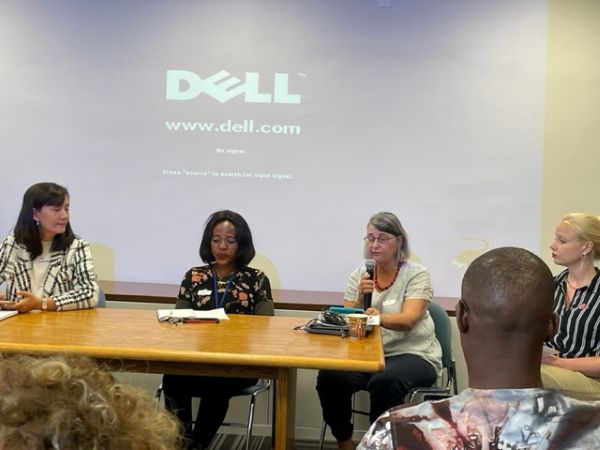 |
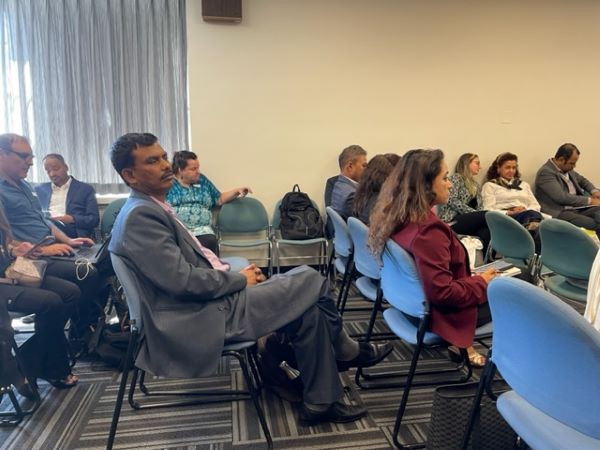 |
The Global People’s Assembly 2023 (GPA) will be on 17 (Sunday) and 18 September (Monday) in New York – at the UN SDG Summit and the UN General Assembly. The assembly will be hybrid - in-person in the Church Centre of the UN (opposite the UN) and participants can also join online.
The aim of the GPA is to bring people’s representatives together and create a strong voice at the SDG Summit for the midpoint of Agenda 2030. One of the priorities of the Global Assembly is to promote the right of all to universal social protection.
The GCSPF is coorganizer of the Global People's Assembly 2023. Sylvia Beales Gelber is also part of the drafting committee for the Declaration which will be no more than two pages and will be finalised on Sunday 17th and shared with the Secretary General of the UN at the start of the Summit.
The Global Coalition together with Africa Japan Forum, the People’s Vaccine, GCAP Africa and GCAP Asia is coorganizing the first session which is “Social Justice: Social Protection and Health, People’s Vaccine” that will take place on Sunday 17th, 2023 from 11.15 am - 12.45 pm New York time (If you will join us online you can confirm your local time here).
The objective of this session will be to articulate the key barriers and solutions to universal health coverage, social protection and achieving social justice for all with key asks to be included in the Declaration and to form the basis of a campaign plan.
Videos and messages will be shared in the session. We want the session to be as interactive as possible. We would really appreciate your in person presence for this in New York and for you to come to the session on line. As we will be developing key messages in the session as well as a campaign plan we therefore invite you to share your videos and messages. Please contact Sylvia (sylvia.bealesgelber AT gmail.com) to coordinate your contribution to this session.
Please register here to participate.
The program of the GPA 2023 is here.
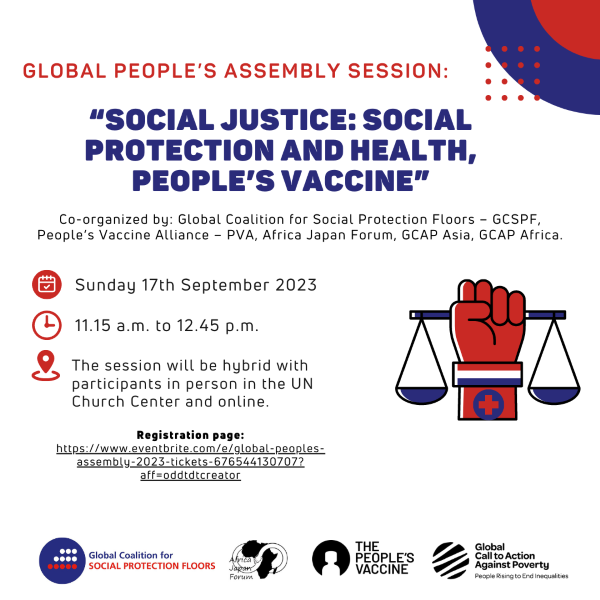 |
The International Symposium on Improving Synergies between Social Protection and Public Finance Management, convened by the ILO, UNICEF, the Global Coalition for Social Protection Floors (GCSPF) and the European Union, brought together policymakers, social partners, civil society, and development partners to discuss the innovative practices and strategies for building sustainable and rights-based social protection systems resulting from the Social Protection & Public Finance Management Programme (SP&PFM).
Many members of the GCSPF participated in the Symposium online, whereas Uzziel Twagilimana (WSM) and Beatrice Di Padua (ITUC) attended physically. As representatives of the GCSPF, Uzziel Twagilimana moderated the Opening and Panel 1: “Extending social protection to all” and Beatrice di Padua spoke at Panel 5: “Joining forces for universal and sustainable social protection and closing remarks”. The video of her intervention is online here.
Launched in 2019, the EU-funded Programme on 'Improving synergies between social protection and public finance management' (SP&PFM Programme) supports 24 countries in achieving gender-responsive, disability-inclusive, and shock-responsive social protection. It also contributes to strengthening the sustainability of social protection financing through advocacy and technical work for increased fiscal space and improved public finance management.
The international symposium reviewed achievements, exchanged country experiences and innovations, and highlighted key research findings. It also looked ahead to how countries can maintain their momentum towards realizing universal social protection.
Information about the “International Symposium on Improving Synergies between Social Protection and Public Finance Management” is available here. The International Symposium was held in Geneva on 27 - 28 June, 2023.
The “Global Forum on Adaptive Social Protection. Protecting lives and livelihoods in times of crisis” provided an opportunity for policymakers, practitioners and social protection experts to jointly examine and discuss the scope and potential of Adaptive Social Protection (ASP) to foster resilience and promote adaptation.
Dr. Magdalena Sepúlveda spoke on behalf of the GCSPF in the opening session “Towards social protection for all in the face of multiple global crises”. The video of her intervention is here.
The “Global Forum on Adaptive Social Protection” was hosted by the German Federal Ministry for Economic Cooperation and Development (BMZ) and the World Bank (WB) and implemented by the Deutsche Gesellschaft für Internationale Zusammenarbeit (GIZ) in cooperation with partners and with support from socialprotection.org. The Global Forum took place in Berlin from 13 to 15 June 2023. Further information is available here.
The German NGO association VENRO released a statement on the Global Forum on Adaptive Social Protection.
Co-hosted by the ILO, UNICEF, the Global Coalition for Social Protection Floors, and the European Union
When: 27 & 28 June | 13.30 – 17.30 CEST
Where: Hybrid, ILO Headquarters (Geneva) and Online
Description
Launched in October 2019, the EU-funded programme on 'Improving synergies between social protection and public finance management' (SP&PFM Programme) has been supporting 24 countries in their efforts towards achieving universal social protection, ensuring they are gender-responsive, disability-inclusive and shock-responsive. The Programme has contributed to strengthen the sustainability of social protection financing through strong advocacy for increased fiscal space for social protection and improved public finance management.
The international symposium offers the chance to take stock of the results achieved, exchange country experiences and innovations, and highlight key research findings of the SP&PFM Programme. It will also look ahead to how countries can maintain their momentum towards realizing universal social protection.
Interpretation will be provided in English, French and Spanish.
Agenda and concept note – Programme brochure - For more information, please click here
The video of the session “IMF's strategy on social spending facing austerity: new direction or bandaid?” is now online. The session was held on Wednesday, April 12th, 2023.
Civil society welcomed the IMF's new policy on social spending in 2019. However, we are concerned that spending on social protection, health and education is still not given sufficient priority in government budgets. Indeed, we fear conditionality in IMF country programs will continue to negatively impact essential social spending. How should IMF and other international agencies, labor movements and CSOs each work to enhance and protect national social spending programs? And, how might international cooperation be strengthened to assure more adequate, efficient, universal and sustainably financed social protection and social services in all countries.
Moderator: Alex Cambpell, International Trade Union Confederation (ITUC)
Panelists:
The event took place at the Civil Society Policy Forum (CSPF) during the 2023 International Monetary Fund - World Bank Group Spring Meetings that was held from April 11 to April 14, 2023 in Washington DC. The video and further information are available here.
The event was co-organized by the Global Coalition for Social Protection Floors (GCSPF), Bretton Woods Project, Human Rights Watch, International Trade Union Confederation (ITUC), Kvinna till Kvinna Foundation, NGO Committee on Financing for Development, Oxfam International, Social Justice in Global Development, Social Policy Initiative (South Africa).
This event was dedicated to the memory of Prof. Michael Cichon. Michael was the inspiration behind and driver of Recommendation 202, founder of the Global Coalition for Social Protection Floors (GCSPF) and he has been an inspiring example to so many people around the world.
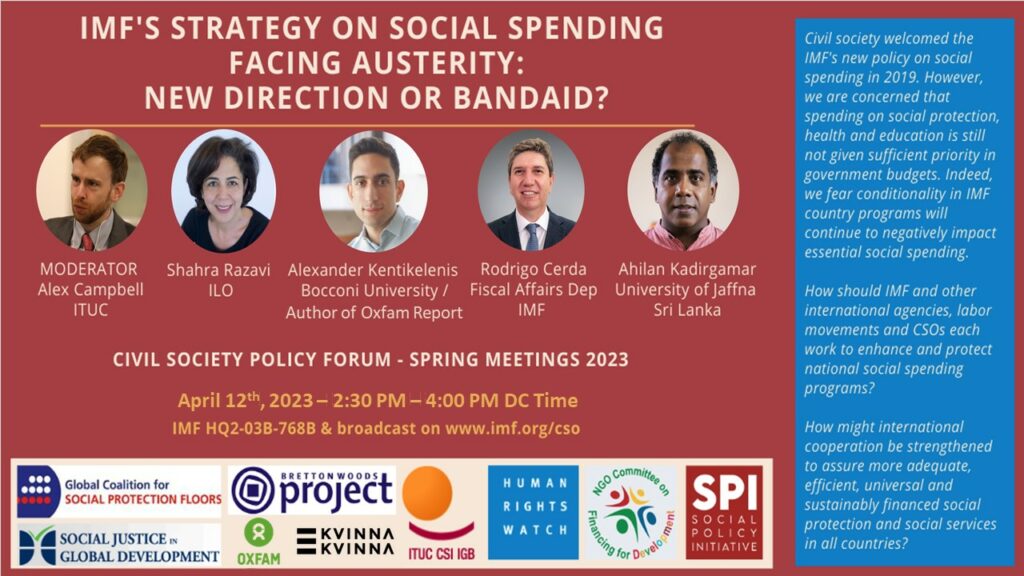
The hybrid session “IMF's strategy on social spending facing austerity: new direction or bandaid?” will be held on Wednesday, April 12th, 2023, from 2:30 pm to 4:00 pm EDT in the IMF HQ2-03B-768B meeting room.
Simultaneous interpretation will be available to Spanish, French, and Arabic for those participating online. Registration is not needed for those that will be joining sessions on zoom. Here is the link for the session:
https://imf.zoom.us/j/98300942112?pwd=NlZQLzVvdU5pbGVjeGdyZThvWFZxZz09
To check your local time zone, please click here.
The session will be broadcast on the IMF website: www.imf.org/cso.
This event will be dedicated to the memory of Prof. Michael Cichon. Michael was the inspiration behind and driver of Recommendation 202, founder of the Global Coalition for Social Protection Floors (GCSPF) and he has been an inspiring example to so many people around the world.
Civil society welcomed the IMF's new policy on social spending in 2019. However, we are concerned that spending on social protection, health and education is still not given sufficient priority in government budgets. Indeed, we fear conditionality in IMF country programs will continue to negatively impact essential social spending. How should IMF and other international agencies, labor movements and CSOs each work to enhance and protect national social spending programs? And, how might international cooperation be strengthened to assure more adequate, efficient, universal and sustainably financed social protection and social services in all countries.
The event will take place during the 2023 Spring Meetings of the World Bank Group and the IMF and the Civil Society Policy Forum that will be held from April 10 to April 16, 2023 in Washington DC.
The event is co-organized by the Global Coalition for Social Protection Floors (GCSPF), Bretton Woods Project, Human Rights Watch, International Trade Union Confederation, Kvinna till Kvinna Foundation, NGO Committee on Financing for Development, Oxfam International, Social Justice in Global Development, Social Policy Initiative (South Africa).
Moderator: Alex Cambpell, International Trade Union Confederation (ITUC)
Panelists
Rodrigo Cerda, Division Chief, Expenditure Policy Division, Fiscal Affairs Department, International Monetary Fund (IMF)
Shahra Razavi, Director, Social Protection Department, International Labour Organization (ILO)
Alexander Kentikelenis, Oxfam International
Ahilan Kadirgamar, Senior Lecturer, Department of Sociology, University of Jaffna, Sri Lanka

The webinar “Be an expert universal social security advocate” was moderated by Lena Simet, Senior Researcher and Advocate, Human Rights Watch.
Stephen Kidd, CEO, Development Pathways (download his presentation), and Holly Seglah, Social Protection Officer, Development Pathways (download her presentation) were the speakers.
Richard Obiga (Programme Officer, Social Protection Secretariat, Kenya) and David Tumwesigye (Global Advocacy Manager, Save the Children International) shared their comments and there was a rich discussion with the audience.
Background
The importance of social security (or protection) is widely and increasingly recognised. However, the question on whether the systems should be built on means-tested and poverty-targeted benefits or on a universal approach is widely debated.
The language we use shapes our thinking, while also shaping the thinking of those with whom we communicate. There is strong evidence for why universal benefits are the best strategy to Leave No One Behind. But “poverty-targeted” support is easily perceived as “pro-poor”, so those who advocate for universal social security need to have very clear arguments.
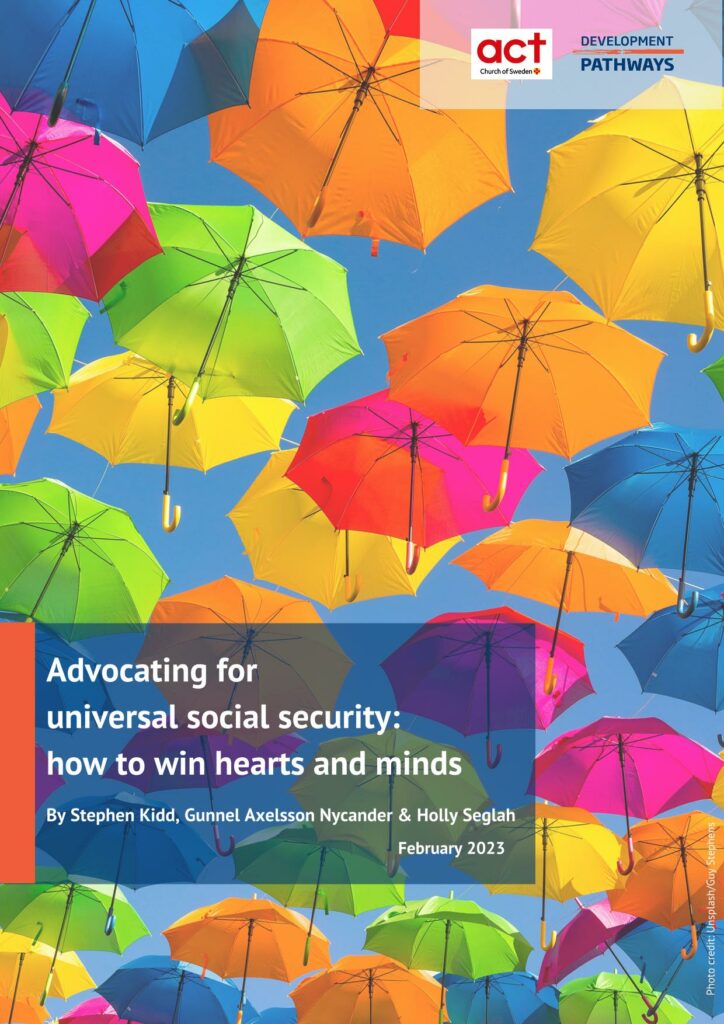
In this webinar, Development Pathways and Act Church of Sweden presented the report, or rather a guide for advocators: Advocating for universal social security: how to win hearts and minds (pdf format).
The document builds on evidence presented in earlier research, and suggests how advocacy for universal social security can be carried out in the most effective way: the words and arguments to use and who to approach.
For further information please contact Gunnel Axelsson Nycander.
The invitation is available here and their bios are here.
This webinar was organised by Development Pathways and Act Church of Sweden and co-organised by the Global Coalition for Social Protection Floors (GCSPF).
Barry Herman made an intervention on behalf of the Congregation of Our Lady of Charity of the Good Shepherd, a member of the GCSPF and also on behalf of the GCSPF at the UN's Development Cooperation Forum. His intervention (see here) was part of the interactive discussion that followed the panel presentation.
The UN's Development Cooperation Forum that met at ministerial level on 14-15 March 2023 in New York, included a session on "Building momentum for effective social protection measures." See the programme here.
Contributing to the debate on national social protection measures were Mr. Alexei Buzu, Minister of Labor and Social Protection of the Republic of Moldova; Mrs. Fatou Gueye Diane, Minister of Women, Family and Child Protection of Senegal; Ms. Marta Eugenia Esquivel Rodriguez, Executive President of the Costa Rican Social Security Fund; and Ms. Sarah Lynne S. Daway-Ducanes, Assistant Secretary, National Economic Development Authority of the Philippines.
International cooperation on social protection, in particular "circular" cooperation among developing countries, was the focus of discussion by Mr. Mariano Berro González, Executive Director of the Uruguayan Agency for International Cooperation, Mrs. Arunee Hiam, Deputy Director-General of the Thailand International Cooperation Agency; and Ambassador Paula Narváez Ojeda, the Permanent Representative of Chile to the United Nations, joined by ambassador Agustín Santos Maraver, Permanent Representative of Spain and Ms. Beate Andrees, Special Representative and Director of the International Labor Organization Office at the UN.
A recording of the discussion is available here.
Statement in the Development Cooperation Forum on behalf of
Congregation of Our Lady of Charity of the Good Shepherd
United Nations, New York, 15 March 2023
Madam President,
My name is Barry Herman, and I make this statement on behalf of the Congregation of Our Lady of Charity of the Good Shepherd, a member of the NGO Committee on Financing for Development in New York, a substantive committee of the Conference of NGOs, and on behalf of the Global Coalition for Social Protection Floors, a network of over 100 NGOs and labour organizations that advocates for enhanced social protection around the world. We all share a keen interest in this morning’s discussion.
The NGO Committee and the Global Coalition regard social protection as a human right. An adequate package of social protection programs would help ameliorate the inherent risks of daily life from conception to old age. It would help empower people to contribute more to society and lead lives of dignity. However, social protection must have an adequate standing in every country’s fiscal accounts.
Governments should want adequate, effective, efficient, universal and sustainable social protection systems. In many countries—rich, poor, and in between—governments are overly influenced by the rich and the companies they control. They would rather starve social protection of needed funds than accept their fiscal responsibility to society.
NGOs, such as the Congregation of Our Lady of Charity of the Good Shepherd, are hard pressed to fill the gap. In fact, they cannot marshal the resources needed. It must be a government responsibility.
How does international cooperation fit into this picture?
First, donor governments and international institutions can use their voices to strengthen the global call for adequate and universal social protection systems.
Second, they can help governments develop these systems when requested.
The development community works in this direction, but it has to do more.
Further policy and cultural reforms are warranted.
One example is the policy on social spending that the International Monetary Fund adopted in 2019. The new policy encourages IMF to engage with UN agencies as well as with the World Bank on social spending. It furthermore recognizes the value of taking into consideration the expertise of civil society in the countries its missions visit.
In fact, we see greater IMF cooperation with UN agencies and civil society. However, austerity pressures seem to still come down too hard on developing economies. We still struggle to ring fence social spending during austerity drives and then adequately expand it and the taxation it requires.
It is nonetheless good to hear the progress that countries are reporting here today.
Civil society recognizes that advancing social protection is an inevitable struggle at domestic and international levels. It is a struggle that we fully embrace.
Thank you, Madam President
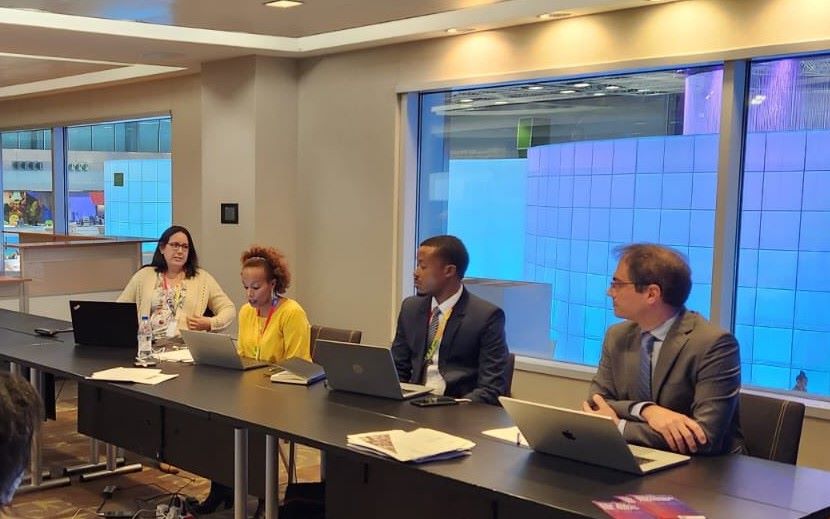
The side event “Progress through Social Protection - Current initiatives and financing at national and international level” took place on Monday, March 6th 2023 during the Civil Society Forum of the Fifth United Nations Conference on the Least Developed Countries (LDC5) that was held in Doha, Qatar.
Speakers at the event were Massimiliano La Marca (Senior Economist, International Labour Office - ILO), Elibariki Msengi (Christian Council of Tanzania), Martha Bekele (Development Initiatives, Ethiopia) and Ana Zeballos (GCSPF).
Ana Zeballos presented the work of the GCSPF. Massimiliano La Marca talked about the work of the ILO in the LDCs, particularly in the framework of the SDGs. Martha Bekele did a presentation focused on domestic and international financing, the Global Fund for Social Protection embedded in the Global Accelerator for Jobs and Social Protection. Martha also presented the new discussion paper Should Global Public Investment finance social protection? And finally, Elibariki Msengi shared with the participants the expansion of health insurance in Tanzania. The presentations were followed by a lively discussion about the situation in the different countries.
Read the programme and the invitation.
This event was co-organised by the Global Coalition for Social Protection Floors (GCSPF), Africa Platform for Social Protection (APSP), Development Initiatives, Christian Council of Tanzania, Act Church of Sweden and Brot für die Welt.
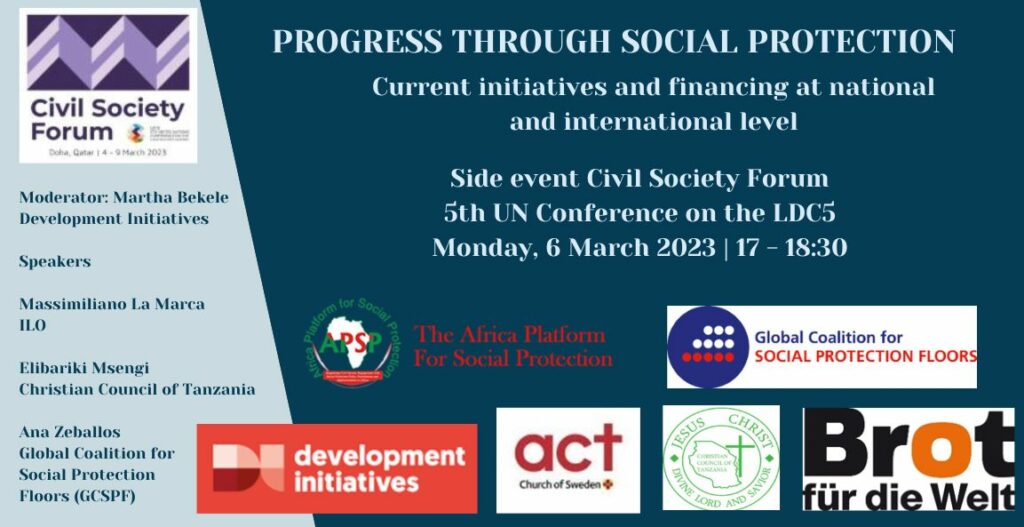
Over 200 civil society organizations and trade unions unite to call for a Global Fund for Social Protection to protect the most vulnerable during COVID-19 and beyond.
The programme Improving Synergies Between Social Protection and Public Finance Management provides medium-term support to multiple countries aiming to strengthen their social protection systems at a national level and ensure sustainable financing. The programme aims to support countries in their efforts towards achieving universal social protection coverage.